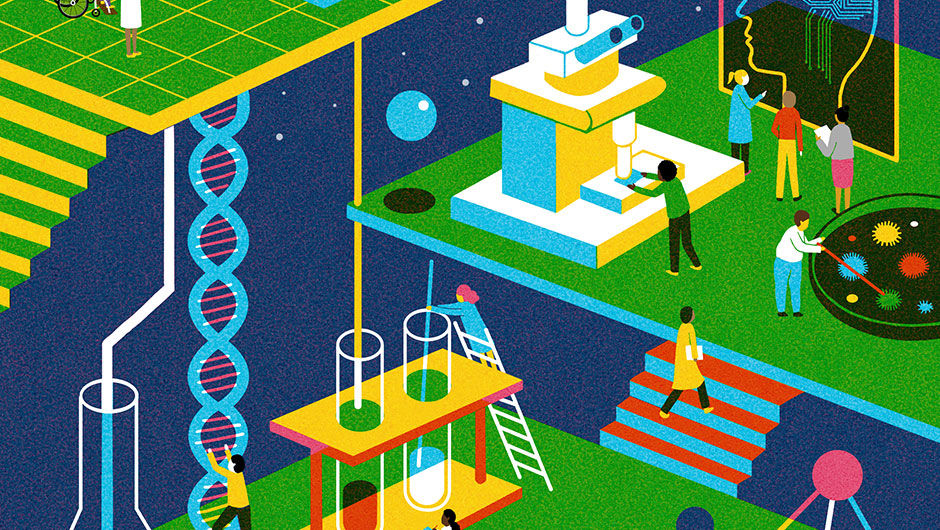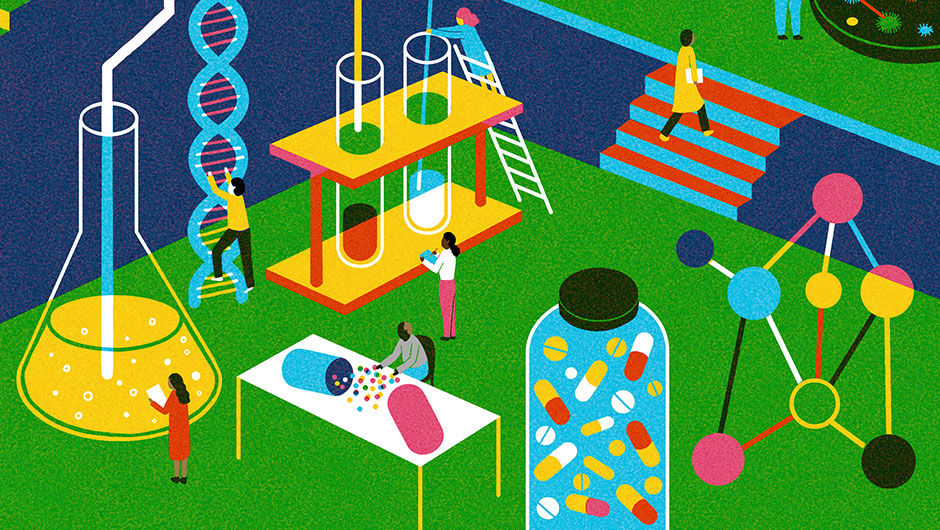
Meet Three Women Who Took Their Careers from the Classroom to the Lab
Peer into the lab where these engineers are working to develop and improve prosthetic devices, medicines, and even that wristband that counts your every step.
Lauren Grosberg (R.G.V. ’06) is a research engineer at the non-profit research institute SRI International. She earned a bachelor’s degree in physics from Yale University and a doctorate in biomedical engineering from Columbia University.
Tracy Norman Giest (Charlotte-Piedmont Triad ’08) is a senior manager at Fitbit where she leads the research and development operations team. She earned a bachelor’s degree in kinesiology from Penn State University and a doctorate in applied physiology from Georgia Tech.
Alicia White (Connecticut ’06) works on the development of biologic medicines for the biotech pharmaceutical group Genentech. She earned a bachelor’s degree in chemical engineering from the University of New Haven and a master’s in biomedical engineering from the University of Connecticut.
What does being a scientist look like, day to day?
Grosberg: I spend some of my time writing proposals to get funding. I enjoy that because it’s where I can think about the big picture and the direction of the research. It’s exciting to be at that place where I can apply knowledge and expertise we’ve learned from past projects to a new area.
Norman Giest: I manage a team at our Fitbit Human Research Lab, where we innovate and refine our algorithms, products, and features and develop the next generation of wearable technologies. I always knew I wanted to be a scientist, but I was not always sure I wanted to be a manager. I had an amazing former manager and mentor who really showed me how an effective manager could help develop and advocate for the people they manage.
White: I typically work with antibodies or similar large molecules. My department focuses on the development of the purification process for the molecule of interest to ensure the desired purity of the product. I’m involved in experiment design and execution, data analysis, report authoring, reviews, and the co-authoring of submissions to health authorities.
Did you always picture yourself leaning into a microscope?
White: No. In college, I worked as an intern at Unilever, in the Dove soap department. I enjoyed the work, but felt I needed to contribute to society in a more meaningful way (not that soap isn’t important!). That led me to Teach For America. But as a teacher, I missed working in the lab.
What’s one of the most exciting projects you’ve been a part of?
Grosberg: I’m working on a project now that is aiming to build a prosthetic device that can encode sensory information from pressure sensors into electrical impulses that are delivered to peripheral nerves. So we’re basically trying to restore the sense of touch, specifically to prosthetic arms and hands.
Norman Giest: During my post-doc an especially fun project was working on robotic exoskeletons for stroke survivors. And at Fitbit, I get excited to work with clinical populations and on interventions to improve quality of life.
White: I was on the team that got Polivy–a cancer therapy drug—to the market. Positive clinical results allowed us to get the Food and Drug Administration’s “breakthrough therapy” designation and priority review. The days were long and strenuous to get the application submitted within two years, but the end result made it worthwhile.

What do people get wrong when they think about your work?
Norman Giest: The labs I’ve worked in don’t necessarily require lab coats or chemicals. Rather, most of them have specialized equipment to test and capture movement or physiological metrics on human subjects.
White: There is a negative stigma around big pharma, but everyone I’ve met where I work is driven by a desire to get medicines to patients and a passion to use our scientific knowledge to help people live better and longer lives.
What’s a unique challenge along this career path?
Grosberg: It can be challenging to handle uncertainty. You may be spending years investigating a specific hypothesis, and you don’t always know if you’re on a successful path. So you have to be OK with the skills you’re gaining along the road—you have to believe that those are valuable regardless of the outcome. That’s a learned skill in research.
What are your hopes for the future of this field?
Norman Giest: I hope to see even more women and other underrepresented groups. It’s so important to have diversity of thought and backgrounds in tech, especially in the development of new consumer products and technologies.
White: I hope medical breakthroughs become commonplace. I hope the industry and government work together to ensure that all people have access to top quality healthcare and medicines. I hope future generations find cures for incurable diseases like cancer and Alzheimer’s.

What advice would you give someone interested in your line of work?
Grosberg: Keep an open mind—that’s key for applied research. Think about the core concepts that you’ve learned and practiced and how they can be applied to new areas. Sometimes we learn a concept in school and then forget about it after we take the test. But if you know your core concepts really well and can think about how to apply them to different areas, that’s really valuable.
White: Think about why you are leaving teaching so you can understand what will make you happy in the long term. It took me time to understand what I needed so that I could be satisfied from a scientific perspective and still be able to do work that has a positive benefit on society.
What skills did you bring from the classroom to the lab?
Norman Giest: The ability to present and communicate scientific concepts to various audiences. A room full of middle school students will let you know quite quickly if you’re boring or confusing them, so I learned to know my audience, understand what motivates them, and incorporate check points for understanding and alignment.
How has the mission of One Day remained part of your life since leaving the classroom?
Grosberg: The mission at my company is to work on research that helps people lead healthier, safer, more productive lives. That’s a big motivator for me—to have a positive impact.
Norman Giest: In graduate school, I co-founded an educational outreach organization at Georgia Tech called Promoting Applied Physiology Education and Research (PAPER). Through PAPER, graduate students develop and present interactive exhibits at science festivals, schools, and other events, to educate children in Atlanta on the science of physiology.
White: While studying for my master’s degree, I found myself drawn to the pharmaceutical field because I wanted to work on medicines that can help people. And I actually still get to work with children through a volunteer program coordinated by Genentech to inspire the next generation of scientists.
Illustrations by Boyoun Kim
Sign up to receive articles like this in your inbox!
Thanks for signing up!
Content is loading...


